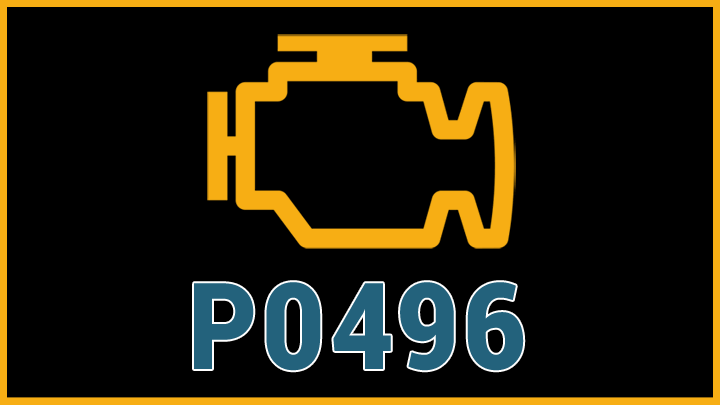P0496 Code (Symptoms, Causes, and How to Fix)
Seeing the “Check Engine” light is never welcome, though modern OBD2 scanners let you read specific diagnostic trouble codes. If code P0496 appears, it signals your onboard computer detected an evaporative emissions system flow issue.
But what does that even mean? Read on to learn the likely causes of a P0496 code, its seriousness, and how to correctly troubleshoot and fix the issue.

What Does Code P0496 Mean?
The EVAP, or Evaporative Emission Control System, plays a vital role in any car, preventing fuel vapors from escaping into the atmosphere. This is an essential process, as both regulators and car manufacturers strive to lower vehicle emissions and improve fuel efficiency.
The EVAP system reports to the Powertrain Control Module (PCM or in some vehicles ECM), sending diagnostic data regularly, as the computer performs various checks on EVAP systems and processes. Any potential issues with the EVAP system trigger different DTCs, and the PCM reports them to the onboard computer on the dashboard.
The definition of Code P0496 is “EVAP Flow During a Non-Purge Condition”. Purge flow is the final part of the process where fuel vapors exit the charcoal canister and flow to the engine for burning. If an unplanned vacuum occurs in the system, the Code P0496 will trigger, and the ‘Check Engine’ light will light up the dashboard.
See Also: Differences Between a PCM, ECU, ECM, and TCM
Symptoms of Code P0496
The symptoms of Code P0496 are notoriously hard to notice. EVAP is a closed system, and purge flow issues such as this are impossible to spot or hear by ear. However, there are some signs that could indicate that your car is having Code P0496 issues:
- The ‘Check Engine’ light is on. Code P0496 will always trigger a ‘Check Engine’ light
- The car might have trouble starting. The buildup of vapors in the engine chamber might cause issues starting the vehicle. This one can be misleading, though, since there are plenty of other causes that the car might not be starting.
- The car is running rich. Another symptom that is hard to spot, but can potentially cause your engine long-term damage.
Causes of Code P0496
EVAP system is exceptionally complex, and plenty of parts, components, and connections might cause the Code P0496 issue. In our experience, these are the most common causes of Code P0496:
- Untightened, damaged, or missing fuel cap
- Faulty purge or vent valve
- Plugged EVAP canister
- Damage to the fuel pressure sensor or EVAP
- Faulty electrical wiring
- There is a short in the electric circuit
- The purge valve on the charcoal canister is defective
- The charcoal canister is blocked
- Faulty vent solenoid
- EVAP system hose is defective and leaking
Is Code P0496 Serious?
Although Code P0496 is a low-priority issue, it is vital to take care of the problem as soon as possible. Problems with starting the car might be irritating but will not cause long-term effects to your car and its engine.
On the other hand, if your car is running rich, you might be doing severe damage to the engine of your car and are heading for an enormous repair bill in the future. Not only that, but the mileage you get from a tank of gas will take a big hit.
See Also: Code P0449
How to Fix
As with most of the repairs and replacements on cars, the diagnostic phase is key to a successful process and minimizing both the cost and the probability of future issues occurring.
Whether you will be performing the repair yourself or hiring a repair technician, a quality OBD-II scanner is an absolute must.
These are the steps:
- Connect the OBD-II scanner to the connection in the car. The scanner will collect the data from the car computer and save it into DTCs. If Code P0496 is present, the technician clears the code and the Check Engine light from the system and restarts. This is to check if the code will come back once the car is on and confirm the code diagnosis.
- Once Code P0496 is the confirmed issue, the technician will check the fuel cap to make sure it’s tightly secured.
- Moving onto the EVAP system sealing with Seal/Purge function. Monitoring fuel pressure sensor is vital, as the system is purging. A higher than regular reading on the fuel pressure sensor is a clear indication of a faulty EVAP canister solenoid valve.
- In case inconsistent readings are coming from the fuel pressure sensor, it needs repair or replacement.
- When checking the mentioned parts and components, a thorough check of the wiring and connections is always a good idea and will decrease the likelihood of future issues.
It can be tricky to diagnose EVAP system issues, even for an experienced hobby-mechanic. If you’re finding it difficult or are unsure in any way, we recommend that you take the car to a registered repair shop near you.
- Replace the Engine or Replace the Car? (11 Factors to Consider) - Apr 11, 2024
- Plastic Piece Dragging Under Your Car? (What It Is and What To Do) - Mar 21, 2024
- Timing Belt vs Timing Chain (What’s the Difference?) - Feb 27, 2024

Chevy Colorado 2016 replacing vapor purge valve-How does the vacuum piece come off the old purge valve?
I’m not sure. Are you talking about a hose that would just pull off of the part?
Does my gm extended warranty cover code po496
I don’t know. You’ll have to read the terms of your warranty.
What is code P0443 in connection purge control valve circuit
What year, make, and model? The purge valve controls fuel vapors in the charcoal canister.